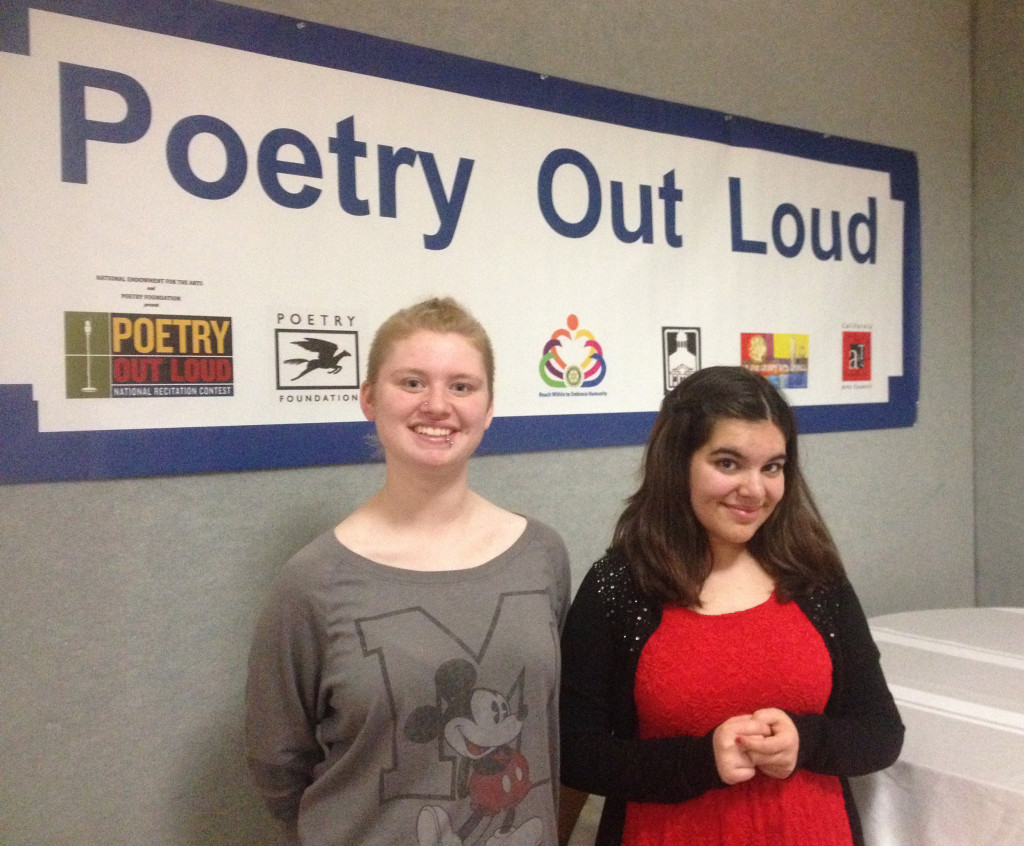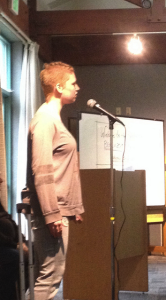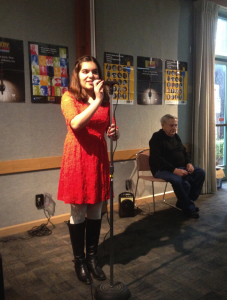
BUSD POETRY OUT LOUD winner Ann Klingelhafer, left, and runner-up Maya Singh-Sharkey.
Courtesy Jady Montgomery
A poem by Oliver Wendell Holmes about the shattered condition of the gallant frigate, the Constitution, and John Clare’s composition “I Am” that compares his life’s esteems to a shipwreck, propelled Ann Klingelhafer to win the Benicia Unified School District’s Poetry Out Loud competition last weekend.
Right behind her came Maya Singh-Sharkey, who recited “Love Song” by Dorothy Parker and “January, 1795” by Mary Robinson, earning runner-up honors.
The contest, which took place Saturday in the Benicia Public Library, “was terrific,” said Jady Montgomery, coordinator for the Benicia Poet Laureate, the office that began encouraging local students’ involvement in the contest when Ronna Leon served in that position from 2010-12.
Lois Requist is the city’s current poet laureate.
“All the students did so well,” Montgomery said. “It was very impressive and moving.”
While most of the participating Benicia High School students entered the contest through their classes, Klingelhafer went a different route, Montgomery said.
“Ann heard the announcement over the school P.A. about the contest, encouraging students who were interested to contact Kim Thompson,” Montgomery said.
“It was purely her own interest and initiative that motivated her to enter the contest and do the work required.”
Thompson is the lead teacher who guides students into the contest through its various levels.
Klingelhafer said when she heard about the contest, she went directly to the lunchtime meeting in Thompson’s classroom.
“I enjoy poetry greatly; it is to me a wonderful outlet for the soul to speak,” the winner said by email this week.
“I loved the idea of being able to combine theatrical performance with poetry, and to try a hand at spoken poetry because it’s so much more powerful than simply written.”
But she hadn’t expected to end the day as the victor.
“I’m honestly quite shocked. I never expected to win, or even come close,” she said.
“In fact, Maya and I are both first years to this competition. Three of our fellow contestants participated last year. I’ve brought a bit of confidence from this, knowing that I have succeeded in something that I never thought I would.”
Klingelhafer and the other competitors had to select and research their poems, memorize them, then recite them in a way that didn’t overshadow the poets’ words, Montgomery said.
She said all were judged on voice, articulation, evidence of understanding, the level of difficulty of the chosen poems and accuracy.
Klingelhafer searched through a book of poems, found eight that she liked, and finally narrowed them to the two she recited.
“I loved the language and feeling of ‘Old Ironsides,’ how it painted in my mind images of a ship in past times. I’ve always enjoyed historical things, so that’s where I clicked with that poem,” she said.
“Old Ironsides” has been the nickname of the USS Constitution that was launched in 1797 and named by President George Washington.
It remains the world’s oldest commissioned naval vessel afloat, and has sailed as recently as August 2012 under its own power to commemorate the 200th anniversary of its victory over the HMS Guerriere in the War of 1812 against Great Britain in the battle that gave the frigate its nickname.
Holmes, who later became chief justice of the U.S. Supreme Court, composed the poem at age 21 after learning the U.S. Navy had planned to dismantle the old warship, writing, “the harpies of the shore shall pluck the eagle of the sea,” and suggesting that, “Oh, better that her shattered hulk should sink beneath the wave,” and that the ship should be given “to the god of storms, the lightning and the gale!”
His poem has been credited with sparking the public sentiment that assured the ship’s preservation.
Klingelhafer’s second poem, a more contemporary composition, begins, “I am: yet what I am none cares or knows.” Clare’s poem describes “the nothingness of scorn and noise,” and envisions himself tossed “into the living sea of waking dreams,” where he longs for pristine places, to sleep untroubled, with “the grass below — above the vaulted sky.”
She said she eventually saw herself in Clare’s verses.
“It was short, and at first glance I didn’t grasp a lot from it — but I felt the pain of exclusion, and it was something I connected to deeply,” the 11th grader said.
She said she researched the Poetry Out Loud website to find tips on recitation, and studied video examples, too.
“I pulled a lot from experience in the past with acting, as well as adding a lot from the helpful tips that several Toastmasters members provided us. I looked into the poem (and) delved deeply into each line to be sure I understood how I interpreted it,” she said.
She researched the background of Holmes’s poem, too, using that as inspiration for her recitation tone.
“I have never done any sort of poetry recitation before, so it’s been really neat going into this and trying to pull theatrics and musical aspects into it, as those are what I’ve done much more of,” she said.
She’s already seeking out a third poem for the next phase of the multi-level competition.
“As far as preparation, I’ll just be learning and practicing and — hopefully — improving the recitation and performance of these lovely pieces,” she said.
“I hope that I leave my heart in the mic at Sacramento; that’s about all I really can hope for.”
She said the experience has deepened her appreciation of poetry.
“There was once a time when I said that I enjoyed poetry but couldn’t write it and had never even considered reading it aloud,” Klingelhafer said.
“Even though it wasn’t my own poetry, I found ways to make it connect to me inside. My interest in poetry has been increasing since I discovered just how much of the soul can leak onto paper in simple verse.”
Klingelhafer anticipates this won’t be the only time she enters a Poetry Out Loud recitation contest.
“I would definitely love to do this kind of thing again, hopefully even with my own writing,” she said. “I think that would be absolutely fantabulous!”
Runner-up Maya Singh-Sharkey, who also competed in Poetry Out Loud for the first time, selected the Dorothy Parker poem after she “fell in love with its darkly comedic tone.”
Her second selection, by Mary Robinson, illustrates the “stark contrast between the lives of the poor and the wealthy, which is still an issue today,” she said.
Parker was one of the founding members of the famous Algonquin Round Table, where she honed her caustic wit. The poem Singh-Sharkey chose is typical of the writer.
Parker appears to faun over “My own dear love,” calling him “strong and bold,” with words that “ring sweet as a chime of gold” and eyes that are “lit with laughter.”
After describing how “he’ll live his days where sunbeams start, nor could storm or wind uproot him,” Parker concludes that her love “is all my heart, — And I wish somebody’d shoot him.”
The Robinson poem she chose is a point and counterpoint of contrasts: “Lords in ermine, beggars freezing; Titled gluttons dainties carving, Genius in a garret starving.”
Robinson describes “Gallant souls with empty purses” and “Honest men who can’t get places,” as well as “School-boys, smit with martial spirit, Taking place of vet’ran merit.”
Singh-Sharkey said she recruited anyone who would listen, and practiced reciting her poems in front of them.
After school, she and Klingelhafer and the other participants met with members of Toastmasters International for additional training.
“The members gave a lot of great feedback regarding voice, physical presence and emotion,” Singh-Sharkey said.
“I’m involved in theater at the high school, and that helped me even though I didn’t act the poem out, because the skills I have learned in my drama classes help not only when acting out a scene, but also when giving school presentations or reciting poetry.”
She learned about the contest through that theater class teacher, Christine Mani, she said. Mani also helped her progress by entering her in the Solano County competition after she didn’t qualify through class-level competition.
“I’m so lucky that they needed more people, because otherwise I wouldn’t be here,” she said.
She added that “It would be an honor” if she reaches the state level of the contest next month in Sacramento, let alone the national level in Washington.
She’s also happy with what she’s accomplished so far, she said.
“Poetry Out Loud has exposed me to so many brilliant poets I had never heard of before, and I will definitely enter the competition again.”
The state level of the competition will take place March 16-17 in Sacramento, and the national contest is April 29-30 in Washington, D.C.








Leave a Reply